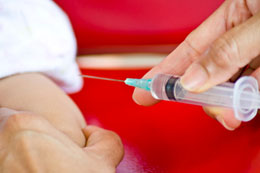Sore legs after a vaccination is a common condition in babies and toddlers. Read ahead to know more on what you can do about it.

Immunizing babies and toddlers is a painful business. You may find yourself wincing at the sight of a needle pricking your baby's chubby little thighs. A scream follows and your heart aches to see your baby in agony. However, experienced parents know that the pain does not end here. Your baby will be cranky and fussy for the next few days. Besides, her little legs may remain sore for at least a few days. All in all, you are in for tantrums and cries after a vaccination schedule. In this article, we have listed some ways for relieving soreness of the leg in babies as well as adults.
Sore Leg in Babies
Soreness in legs is more common after a DTaP shot in babies. You may find that your baby becomes very fussy and cranky after the shot. She may shriek in pain and cry for hours. A slightest hint of touch may aggravate the pain and soreness in her leg, and may send her into a series of ear splitting screams. As much as you may want to ease her pain, touching or massaging her leg may only cause unbearable pain to her. In such cases, it is best to give her a non aspirin pain reliever such as acetaminophen. However, give this medication only to babies that are over 3 months of age. Stay away from baby aspirin as it is a blood thinner. A pain reliever may also help get her some good sleep, thereby reducing crankiness.
Another good way of relieving her pain is by cycling her little legs immediately after the shot. This helps to prevent soreness in the leg to some extent, and also causes the medication to circulate through the body. In case of toddlers, you can encourage them to do a few rounds of head-shoulders-knees-toes. This will loosen the muscles a bit and prevent any stiffness. Even after taking these measures, you may still find your baby crying for most of the time. Her body may also feel a little feverish. As long as the body temperature stays inside 101 °F, you have no reason to worry about her health. However, if you notice any of the following symptoms, you may want to take her to the doctor right away.
- Fever exceeding temperature limit of 103 °F.
- Persistent crying for 3 hours or more.
- Breathing difficulty.
- Convulsions or seizures.
- Nausea and vomiting.
- Listlessness for prolonged period.
- Allergic reaction characterized by swelling of mouth or any body part.
- Abnormal behavior.
Sore Leg in Adults
Even adults may experience a little soreness in the leg after a particularly heavy shot. Adults can benefit a great deal from taking a few strides right after a shot is administered. This helps the muscles to relax and prevent soreness. If that does not help, you may try hot and cold compresses to relieve the soreness. In the end, if the pain becomes unbearable, you may take an acetaminophen or ibuprofen, both of which are effective in controlling pain caused by soreness. Generally, adults may have no trouble in managing the pain, and whatever soreness they feel usually subsides within a few hours. Nonetheless, if you experience any undesirable symptoms such as those mentioned above, you may want to consult a physician on a priority basis.
As already mentioned above, soreness in the legs is something you can expect after every vaccine schedule. Toddlers may be able to establish a link between a shot and subsequent pain, and may attempt to resist immunization. However, do not let this behavior deter you from getting your child his shots, as they provide lifetime protection against an array of diseases.


 Immunizing babies and toddlers is a painful business. You may find yourself wincing at the sight of a needle pricking your baby's chubby little thighs. A scream follows and your heart aches to see your baby in agony. However, experienced parents know that the pain does not end here. Your baby will be cranky and fussy for the next few days. Besides, her little legs may remain sore for at least a few days. All in all, you are in for tantrums and cries after a vaccination schedule. In this article, we have listed some ways for relieving soreness of the leg in babies as well as adults.
Immunizing babies and toddlers is a painful business. You may find yourself wincing at the sight of a needle pricking your baby's chubby little thighs. A scream follows and your heart aches to see your baby in agony. However, experienced parents know that the pain does not end here. Your baby will be cranky and fussy for the next few days. Besides, her little legs may remain sore for at least a few days. All in all, you are in for tantrums and cries after a vaccination schedule. In this article, we have listed some ways for relieving soreness of the leg in babies as well as adults.